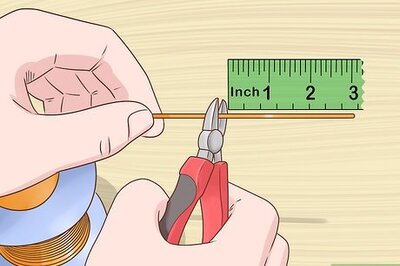
views
In this article, we will shed some light on an extremely rare congenital condition, diphallia.
Diphallia is an extremely rare congenital condition in which a male is born with two penises. Estimated to occur in 1 in 5-6 million males, diphallia results from an abnormality during fetal development where two genital tubercles form instead of one. If someone has diphallia, they were born with two separate penises, each with its own urethra. While diphallia may seem an anatomical curiosity, for those living with it, the day-to-day realities can be complicated. Some men have full sensation and function in both penises, while for others, one penis may be more developed or only one is able to achieve an erection or ejaculate. Some elect to have one penis removed via surgery.
Causes of Diphallia
Diphallia, the rare condition of being born with two penises, occurs when the genital tubercle, the embryonic structure that develops into the penis, fails to properly fuse during fetal development. The exact cause of diphallia is unknown, though scientists believe it likely results from a combination of genetic and environmental factors disrupting development in the womb. In some cases, diphallia may be linked to a family history of the condition, suggesting genetics plays a role for some. Exposure to certain medications or chemicals during pregnancy could also potentially influence development and increase the chance of diphallia, though more research is needed.
The Physical Effects of Having Two Penises
Living with two penises certainly comes with its fair share of physical challenges. For one, finding comfortable underwear and pants that accommodate both penises can be difficult. Most men with diphallia end up wearing loose-fitting boxer shorts and sweatpants.
• Hygiene: Keeping both penises clean requires extra effort and time. Showering, bathing and using the restroom all need to be done carefully to properly clean each penis. Some men find using a handheld shower head, wet wipes, and air-drying help make the process easier.
• Sexual Activity: Engaging in any kind of sexual activity, whether with a partner or alone, requires patience and open communication. Determining which penis to stimulate, how to position one’s self and one’s partner, and managing two sensations at once can be complicated. Many men with diphallia find certain positions work better than others for penetrative sex with a partner. Masturbation may also need to focus on one penis at a time.
• Medical Care: Seeking medical care for issues with either penis must be done with a doctor experienced in diphallia and other congenital anomalies. Circumcisions, if needed or desired, have to be carefully coordinated. Other surgeries to correct chordee, hypospadias or improve function or appearance of the penises require a specialist. Regular checkups are also important to monitor for any changes, as some studies show higher risks of penile cancer in those with diphallia.
For those living with diphallia, one penis is often non-functional. The appearance and function of each penis can differ greatly between individuals. Some are similar in size and ability, while others vary dramatically. Surgery is typically recommended early in life to remove the non-functional penis and correct any other genital abnormalities.
The Emotional and Mental Impacts
Living with diphallia, or two penises, brings a mix of emotions. On one hand, it’s a rare and unique condition, but it also comes with challenges and insecurities.
• Self-esteem: Having an extra penis would understandably impact how you view yourself and your self-worth. You may struggle with feeling “normal” or worry about how sexual partners will react. Building confidence and learning self-acceptance is crucial. Speaking with a therapist or counsellor experienced with body dysmorphia and sexuality can help address these concerns.
• Sex and relationships: Dating and developing relationships can stir up anxieties for any man, let alone one with two penises. You may face awkward questions, insensitive comments, or outright rejection from partners due to a lack of understanding. However, there are open-minded individuals who will appreciate you for who you are. When you meet the right person, communicate openly about your anatomy, needs and concerns. An empathetic, patient partner will make intimacy much more fulfilling and help boost your confidence over time.
• Practical challenges: Aside from the psychological impacts, diphallia also brings practical difficulties. Simple tasks most take for granted like using the bathroom or wearing pants may require some adjustment or accommodation. It’s important to keep a sense of humour and not let irritation or embarrassment build up over small inconveniences. Speaking to others with similar conditions can help in developing useful tips and coping strategies for navigating daily life with two penises.
While diphallia is an extremely rare disorder, the emotional experiences that come with it are universal. Focusing on self-care, honest communication, and maintaining a support network will help establish a healthy mindset and balanced perspective on this extraordinary condition.
Conclusion
So, there you have it, a glimpse into what living with two fully functioning penises is really like. While living with two penises certainly presents challenges, many men are able to have healthy sex lives and normal urinary/reproductive function with the proper medical care and lifestyle adjustments. Open communication with partners and patience with oneself is key. Don’t hesitate to explain your condition, and look for doctors experienced working with people who have congenital anomalies. The more they know, the better they can address any health issues that arise.
With the right mindset and support, diphallia does not have to limit your capacity for pleasure or happiness. Focus on surrounding yourself with people who appreciate you for who you are, and embrace learning what makes you feel fulfilled in your own skin.




















Comments
0 comment